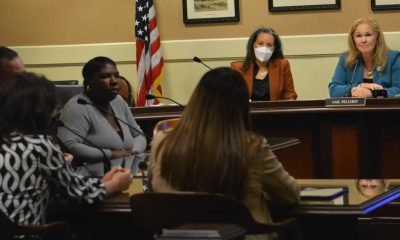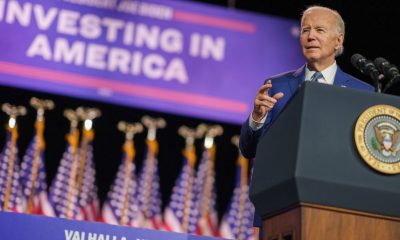Black History
COMMENTARY: Remembering Dr. King and “The Other America”
NNPA NEWSWIRE — “Little children in this other America are forced to grow up with clouds of inferiority forming every day in their little mental skies. As we look at this other America, we see it as an arena of blasted hopes and shattered dreams,” said Dr. King…
By Charlene Crowell, NNPA Newswire Contributor
Once again on the third Monday in January, much of the nation will mark the anniversary of the death of the late Rev. Dr. Martin Luther King, Jr. Countless programs and events will no doubt recall several of his famous speeches from the 1963 March on Washington’s “I Have A Dream to his “I’ve Been to the Mountaintop” delivered in Memphis during the 1968 sanitation workers’ strike.
In a life of only 39 years, Dr. King captured global attention in his valiant, nonviolent fight for the values of freedom, justice and equality. Preaching and fighting for long overdue citizenship rights first promised to all in the Declaration of Independence, he championed economic justice – especially for Blacks to have safe, decent, and affordable housing. He also called for full participation in the economy, and an end to financial exploitation.
Now 51 years since his assassination, his words still strike a resonant chord. His words — written as prose but markedly poetic — remain as timely as they are timeless.
“There are so many problems facing our nation and our world, that one could just take off anywhere,” Dr. King said in a speech delivered on April 14, 1967 at Stanford University.
Entitled, “The Other America” Dr. King began by recapping the nation’s bounty and beauty, noting how “America is overflowing with the milk of prosperity and the honey of opportunity”, and how “millions of young people grow up in the sunlight of opportunity”.
For his audience, those comments almost certainly reflected the lifestyles of the students attending one of the nation’s elite educational institutions.
In his inimitable Baptist cadence, Dr. King then went on to speak of the “Other America” that was equally real but far removed from the commonplace privilege associated with Stanford.
“Little children in this other America are forced to grow up with clouds of inferiority forming every day in their little mental skies. As we look at this other America, we see it as an arena of blasted hopes and shattered dreams,” said Dr. King. “It’s more difficult today because we are struggling for genuine equality. It’s much easier to integrate a lunch counter than it is to guarantee a livable income and a good solid job. It’s much easier to guarantee the right to vote than it is to guarantee the right to live in sanitary, decent housing conditions.”
In 2019 the two Americas Dr. King wrote about still remain. A nation once lauded for its enviable and expanding middle class has evolved into a nation of people who are either growing wealthy or growing poor. In this unfortunate process, the nation’s envied middle class is vanishing.
Historically, homeownership has been a reliable measure of the nation’s middle class. Late last year it stood at 64.4 according to the Census Bureau. Yet when race and ethnicity are added who owns a home today discloses a far different picture. White homeownership was higher than the national average at 73.1 percent.
But Blacks still-suffering from the financial losses from the now decade-old foreclosure crisis had a homeownership rate of 41.7 percent, lower than its pre-housing crisis rate of 47.7 percent. Today’s Black homeownership resembles the same levels experienced at the time of the 1968 Fair Housing Act’s passage.
Latino homeownership today is higher than that of Blacks at 46.3 percent; but still lower than its earlier pre-crisis rate of 47.7.
Housing also remains troubled for renters as well. According to the National Low-Income Housing Coalition, the nation lacks more than 7 million affordable rental homes that affect 43.8 million families. Moreover, 11 million families pay more than half of their income on housing and are considered severely-cost burdened.
As of January 3, over 1,100 HUD contracts with landlords for its Section 8 rental voucher program expired. By February, another 1,000 more contracts are expected to expire. At press time, the stalemated federal government shutdown continued, leaving millions of people uncertain about their lives, or livelihoods or both. While landlords and HUD figure out the paperwork, 1.2 million families relying on this vital rental support program remain at risk.
Also caught in partisan bickering of a federal government shutdown are men and women – the military and civil servants – whose service to the country is deemed so essential that they must continue to work without knowing when another paycheck will arrive. Another 800,000 furloughed federal workers may be at home; but like others affected by the shutdown, they too still need to pay their rent or mortgage, honor their financial obligations and take care of children as best they can.
When times are tough financially, a range of predatory lenders seize opportunities to tempt those who are hard-pressed for cash with interest rates on loans that would make a bookie blush. When a loan of only a few hundred dollars comes with interest payments that double or triple the cash borrowed, predatory lenders are ready to exploit those with few or no financial options.
Those who are unpaid or underemployed – those who are working but failing to earn a salary comparable to their education and training, student loan repayments can take a financial backseat to housing, utilities, or other daily living needs.
At press deadline, the federal shutdown was approaching the 1995 shutdown record of 21 days.
In 1967 Dr. King advised his Stanford University audience, “Somewhere we must come to see that social progress never rolls in on the wheels of inevitability. It comes through the tireless efforts and the persistent work of dedicated individuals…. And so, we must help time, and we must realize that the time is always right to do right.”
This year, may we all honor Dr. King and do our respective efforts to make America live up to its promise of opportunity for all.
Charlene Crowell is the Center for Responsible Lending’s Communications Deputy Director. She can be reached at Charlene.crowell@responsiblelending.org.
Activism
S.F. Black Leaders Rally to Protest, Discuss ‘Epidemic’ of Racial Slurs Against Black Students in SF Public School System
Parents at the meeting spoke of their children as no longer feeling safe in school because of bullying and discrimination. Parents also said that reported incidents such as racial slurs and intimidation are not dealt with to their satisfaction and feel ignored.

By Carla Thomas
San Francisco’s Third Baptist Church hosted a rally and meeting Sunday to discuss hatred toward African American students of the San Francisco Unified School District (SFUSD).
Rev. Amos C. Brown, president of the San Francisco NAACP and pastor of Third Baptist Church, along with leadership from local civil rights groups, the city’s faith-based community and Black community leadership convened at the church.
“There has been an epidemic of racial slurs and mistreatment of Black children in our public schools in the city,” said Brown. “This will not be tolerated.”
According to civil rights advocate Mattie Scott, students from elementary to high school have reported an extraordinary amount of racial slurs directed at them.
“There is a surge of overt racism in the schools, and our children should not be subjected to this,” said Scott. “Students are in school to learn, develop, and grow, not be hated on,” said Scott. “The parents of the children feel they have not received the support necessary to protect their children.”
Attendees were briefed last Friday in a meeting with SFUSD Superintendent Dr. Matt Wayne.
SFUSD states that their policies protect children and they are not at liberty to publicly discuss the issues to protect the children’s privacy.
Parents at the meeting spoke of their children as no longer feeling safe in school because of bullying and discrimination. Parents also said that reported incidents such as racial slurs and intimidation are not dealt with to their satisfaction and feel ignored.
Some parents said they have removed their students from school while other parents and community leaders called on the removal of the SFUSD superintendent, the firing of certain school principals and the need for more supportive school board members.
Community advocates discussed boycotting the schools and creating Freedom Schools led by Black leaders and educators, reassuring parents that their child’s wellbeing and education are the highest priority and youth are not to be disrupted by racism or policies that don’t support them.
Virginia Marshall, chair of the San Francisco NAACP’s education committee, offered encouragement to the parents and students in attendance while also announcing an upcoming May 14 school board meeting to demand accountability over their mistreatment.
“I’m urging anyone that cares about our students to pack the May 14 school board meeting,” said Marshall.
This resource was supported in whole or in part by funding provided by the State of California, administered by the California State Library via California Black Media as part of the Stop the Hate Program. The program is supported by partnership with California Department of Social Services and the California Commission on Asian and Pacific Islander American Affairs as part of the Stop the Hate program. To report a hate incident or hate crime and get support, go to CA vs Hate.
Activism
Oakland Post: Week of May 1 – 7, 2024
The printed Weekly Edition of the Oakland Post: Week of May 1 – 7, 2024

To enlarge your view of this issue, use the slider, magnifying glass icon or full page icon in the lower right corner of the browser window. ![]()
Activism
Oakland Post: Week of April 24 – 30, 2024
The printed Weekly Edition of the Oakland Post: Week of April 24 – 30, 2024

To enlarge your view of this issue, use the slider, magnifying glass icon or full page icon in the lower right corner of the browser window. ![]()
-

 Community3 weeks ago
Community3 weeks agoFinancial Assistance Bill for Descendants of Enslaved Persons to Help Them Purchase, Own, or Maintain a Home
-

 Business3 weeks ago
Business3 weeks agoV.P. Kamala Harris: Americans With Criminal Records Will Soon Be Eligible for SBA Loans
-

 Activism4 weeks ago
Activism4 weeks agoOakland Post: Week of April 10 – 16, 2024
-

 Community3 weeks ago
Community3 weeks agoAG Bonta Says Oakland School Leaders Should Comply with State Laws to Avoid ‘Disparate Harm’ When Closing or Merging Schools
-

 Activism2 weeks ago
Activism2 weeks agoOakland Post: Week of April 24 – 30, 2024
-

 City Government4 days ago
City Government4 days agoCourt Throws Out Law That Allowed Californians to Build Duplexes, Triplexes and RDUs on Their Properties
-

 Community2 weeks ago
Community2 weeks agoRichmond Nonprofit Helps Ex-Felons Get Back on Their Feet
-

 Community2 weeks ago
Community2 weeks agoOakland WNBA Player to be Inducted Into Hall of Fame




















































